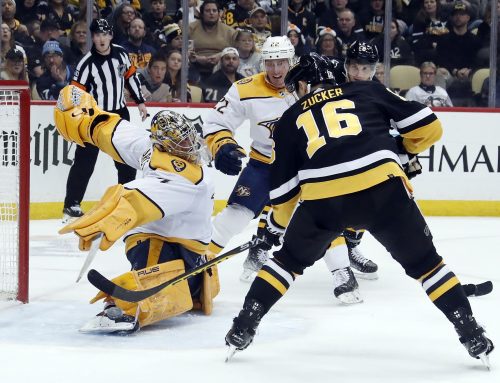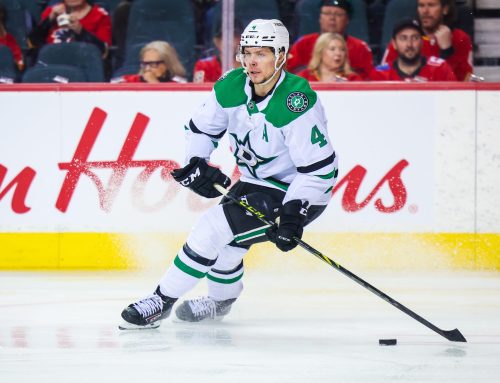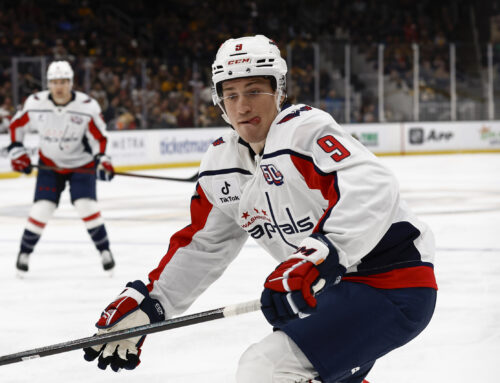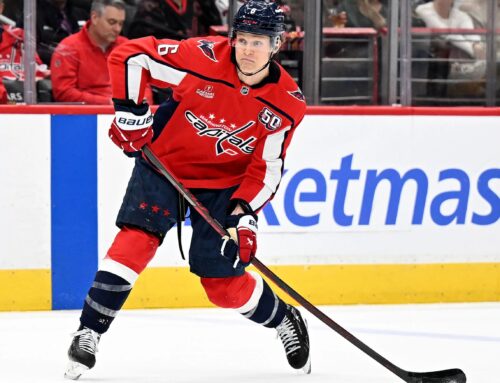
Trade deadline day has come and gone, and we are all left wanting just a little bit more. However, as a fan of the Leafs and the Predators, I was content with the “Less is More” mantra that seemed to be followed by both teams. The Maple Leafs pulled off only one deal, for Tomas Plekanec to come in as their fourth line centre the day before the deadline. They paid a premium (a second-round pick) because Montreal is retaining half of his salary – such is life in the cap world. Nashville on the other hand, picked up young forward Ryan Hartman, signed Mike Fisher out of retirement, and moved around some AHL depth. The Predators paid a premium of futures for Hartman, the former Blackhawk, as he is under team control until his age-27 season (he is currently 23). The getting players with multiple years of control is a big focus of GM David Poile, and it is paying off both now and with the future outlook.
Anyways, I could ramble on about those two teams all day. Unfortunately, we only have an article, so let’s get to the other moves.
****
The Penguins Re-Sign Patrick Hornqvist
Steve Laidlaw did a great job of summing up his thoughts on the Hornqvist signing in Tuesday’s ramblings. I agreed with just about all he had to say, but there are a few key points to really drive home for Hornqvist owners (or shoppers). At the age of 31, Hornqvist’s best years are behind him, but his largest price tag is upon us. The contract prediction model had the Pittsburgh winger projected for five years with an AAV of $4.8 million. This shows that the term and price were necessary evils for the Penguins if they wanted to keep him around. However, just because they paid market value, doesn’t mean they are getting contract value.
Verdict: Solid contract for another season or two, becoming an anchor in years three through five.
****
The Olympians Make Some Dough
A few recent Olympian competitors signed one-year deals with NHL teams after good showings in Peyongchang.
Chris Kelly – $1,250,000
Cody Goloubef – $650,000
Brian Gionta – $700,000
None of these players are breaking the bank, and none will likely be fantasy relevant. Really these are just depth injury replacements for playoff-bound teams. I won’t recommend any of these players for your standard fantasy squad, but the new Bruin, Brian Gionta, is likely the one with the most upside here. This is looking even more possible with Boston’s first line centre, Patrice Bergeron, currently out for a minimum of two weeks with a broken bone in his foot. The Bruins’ second line centre, David Krejci, also seems to see more than his fair share of injuries.
Verdict: Irrelevant fantasy-wise, but a feel-good story nonetheless.
****
The Price of Cap Space
Some of the bigger names this deadline season were moved to teams who couldn’t take on the full salary. Retained salary transactions are becoming more of the norm, as teams try to add bigger pieces than they would otherwise be able to fit. Looking at trades from this year, involving Rick Nash, Tomas Plekanec, Paul Stastny and Derick Brassard, the going rate of retaining half of a player’s salary seems to be about a second-round pick. As mentioned above, this is why the Leafs gave up their second-round pick for Plekanec, and why St. Louis received Erik Foley and a fourth-round pick on top of a first for Stastny.
Knowing how much your cap space is worth is a large part in successfully wheeling and dealing in a salary cap league. All too often, managers are taken advantage of simply because they don’t understand how to balance player value and cap space. As a result, the trades end up being one of two things: a cap dump, or an even player value trade with neutral cap hits going both ways. Knowing how to put those two elements together is the difference between contending year-after-year, and being a fringe team in salary cap leagues. The best way to break these kinds of things down is to evaluate a trade in little pieces. If all of the little pieces add up, great. If not, then it’s time to re-jig the deal.
For example, let’s walk through Vegas’ role in the three-team trade from last Friday with Ottawa and Pittsburgh.
In:
2018 4th round pick
40% of Brassard’s salary ($3,000,000) for this year and next.
Out:
Tobias Lindberg
Vegas really didn’t give up much here. Tobias Lindberg has been moved around in a handful of trades over the last few years, always as a bit of a throw in. His value is negligible relative to the other pieces we are discussing in this case.
Coming in, Brassard’s $3 million price tag is balanced by Ryan Reaves and a fourth-round pick. If we assume the 2nd round pick price tag being consistent here for retaining Brassard’s salary, then your evaluation of whether Vegas did well or poorly in this trade comes down to whether or not Reaves covers the difference between a second-round pick and a fourth. We’ll leave that up for debate in the comments.
In general, it seems as though it is close to a fair deal for Vegas. However, if they meet Pittsburgh in the finals, maybe Brassard will be saying otherwise.
Verdict: The Knights were creative in using up cap space that was sitting dead anyways, so we’ll call it a win for them even though they didn’t necessarily get full value for it.
****
That caps off another Thursday. Let me know if there are any other topics you would like to see covered before the regular season wraps up next month.
If you can’t get your fill on Thursdays, you can find me on twitter any day of the week @alexdmaclean
9 Comments
Leave A Comment
You must be logged in to post a comment.





 SEA
SEA CHI
CHI OTT
OTT EDM
EDM DAL
DAL STL
STL ANA
ANA FLA
FLA CBJ
CBJ L.A
L.A CAR
CAR

Two reasons I think Vegas got hosed in that deal:
1. Reaves is garbage and yeah maybe you think he’s a good locker room guy or whatever, but they had plenty of that there and didn’t need him, even for depth reasons. And I’d take a 2nd round pick over him any day. To put it mildly, if you traded a 2nd round pick for Reaves straight up, you’d have lost that deal badly. Plus they retained salary of another player. Mind-boggling.
2. Why would you help the Penguins? Yeah, I know it means you don’t have to see Brassard till the finals but… if your goal here and the reason you gave away 3 picks for Tatar in your other deal is that you think this team can make the cup, then its a moot point, anyways… Don’t help anyone but yourself.
After nailing the expansion draft maybe by sheer luck, this was a nice reminder of the kind of GM George McPhee is.
A bad one.
LV’s deadline deals didn’t help them at all. Might have hurt ’em’.
We’ll see.
I’ll reply to both your points here:
1. Every team values players differently, which is part of the fun of trade deadline day. I would take a second round pick over Reaves as well, however that doesn’t mean he doesn’t have value to Vegas now. Vegas succeeded much earlier than most anticipated, and I think they want to make sure they don’t lose fans by flopping in the playoffs or tanking next year. As a result, their deadline moves were a little more short-sighted. Reaves has six years of playoffs under his belt, and will be a solid contributor for the Golden Knights come spring. Was it worth the value of a second round pick? Just based on that logic, no. However, Vegas had some other incentive, which leads me to point number two.
2. I’m sure you’ve heard of the adage, “the enemy of the enemy is my friend”. Something to that effect happened here. Vegas knew there was a bidding war between Pittsburgh and Winnipeg for Brassard, and saw Winnipeg as the closer (and more likely enemy) than Pittsburgh. As a result, they had a little incentive to want to help Pittsburgh get the deal done. What are the odds that Vegas plays Pittsburgh in the finals this year? Pretty slim.
McPhee may not be the greatest GM, or the best evaluator of player talent, however he is a very savvy person, and this was a calculated move.
Whether this was calculated or not, it’s overthought. Just because he values Reaves higher than most of us would doesn’t mean he gets a pass for valuing him that way- Reaves is, regardless, not a good a player who won’t help this team- playoff experience or not (they had plenty of experienced guys, Neal was literally in the cup last year)
And for the Brassard trade, I get if its the deadline and Brassard is the only player available and its 3PM and he’s either going to Pitt or Winnepeg and that’s the last deal either team will make and he chooses to help pitt there, but he overthought this because the deal was made early and is basically the reason winnepeg wound up with a better player by getting Stastny and the odds of him facing Pitt in the cup are slim, but they weren’t gonna face winnipeg till the conference finals anyways. I just think this was overthought, calculated sure, but there was no need for him to do it and it really didn’t make his path to the cup any easier- if anything it did the opposite- that’s the sign of a bad GM- meddling in things that don’t improve your on-ice product. Especially when you add in the deal he made for Tatar. Player evaluation, trade ideas, he’s just not a good GM and he’s not very savy when you look at his history of moves. I like Vegas as a team this year, I think they might actually make a deeper run than most are thinking, but man…. this was not a good deadline.
Agree to disagree?
I think the biggest thing here is that Vegas is using what would have been dead cap space, and acquired a pick for it. Bottom line, that’s good asset management. Reaves is close to a net-neutral (though I see him as a positive) so all-in-all, a win for Vegas.
No totally fair, not trying to be an ass- enjoyed your article. Just don’t see the point in meddling in other teams affairs. We’ll see how it all works out. I’ll be laughing if it’s Stastny in the conference finals and Brassard in the finals. I get the use of cap space that’s otherwise meaningless, just felt like
overthinking to me, something all GMs are guilty of.
And that’s completely fair. I think the counterpoint to that is that if Vegas hadn’t gotten involved, Pittsburgh/Winnipeg would have figured something out anyways, so they might as well get something out of it.
Glad to hear you enjoyed the article!
Vegas won that deal handily, as long as they don’t need the cap space used on Brassard next year. That’s going to be the only issue, because a 4th round pick & Reaves is worth more than Lindberg.
The use of the cap space for this year is essentially cashing in a near-valueless asset. Would one prefer a higher pick, and not a player and a pick? Possibly, but that may have been important to get the deal approved, since it was rejected at one point.
The only reason the deal was rejected initially was because of the sequence of trades. What Vegas got in return had nothing to do with it. The NHL doesn’t jump in unless there are egregious loopholes to be considered (a-la Kovalchuk). I agree with your general ideas though, thanks for the comment.